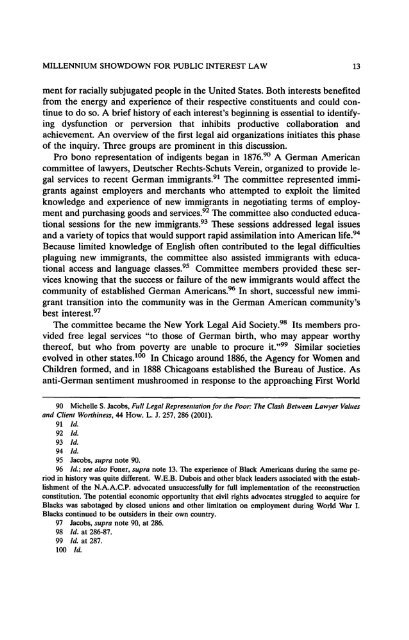Download Electronic Version - UDC Law Review
Download Electronic Version - UDC Law Review
Download Electronic Version - UDC Law Review
You also want an ePaper? Increase the reach of your titles
YUMPU automatically turns print PDFs into web optimized ePapers that Google loves.
MILLENNIUM SHOWDOWN FOR PUBLIC INTEREST LAW 13<br />
ment for racially subjugated people in the United States. Both interests benefited<br />
from the energy and experience of their respective constituents and could continue<br />
to do so. A brief history of each interest's beginning is essential to identifying<br />
dysfunction or perversion that inhibits productive collaboration and<br />
achievement. An overview of the first legal aid organizations initiates this phase<br />
of the inquiry. Three groups are prominent in this discussion.<br />
Pro bono representation of indigents began in 1876. 90 A German American<br />
committee of lawyers, Deutscher Rechts-Schuts Verein, organized to provide legal<br />
services to recent German immigrants. 91 The committee represented immigrants<br />
against employers and merchants who attempted to exploit the limited<br />
knowledge and experience of new immigrants in negotiating terms of employment<br />
and purchasing goods and services.92 The committee also conducted educational<br />
sessions for the new immigrants. 93 These sessions addressed legal issues<br />
and a variety of topics that would support rapid assimilation into American life. 94<br />
Because limited knowledge of English often contributed to the legal difficulties<br />
plaguing new immigrants, the committee also assisted immigrants with educational<br />
access and language c1asses. 95 Committee members provided these services<br />
knowing that the success or failure of the new immigrants would affect the<br />
community of established German Americans. 96 In short, successful new immigrant<br />
transition into the community was in the German American community's<br />
best interest. 97<br />
The committee became the New York Legal Aid Society.98 Its members provided<br />
free legal services "to those of German birth, who may appear worthy<br />
thereof, but who from poverty are unable to procure it. ,,99 Similar societies<br />
evolved in other states. 1OO In Chicago around 1886, the Agency for Women and<br />
Children formed, and in 1888 Chicagoans established the Bureau of Justice. As<br />
anti-German sentiment mushroomed in response to the approaching First World<br />
90 Michelle S. Jacobs, Full Legal Representation for the Poor: The Clash Between <strong>Law</strong>yer Values<br />
and Client Worthiness, 44 How. L. J. 257, 286 (2001).<br />
91 [d.<br />
92 [d.<br />
93 [d.<br />
94 [d.<br />
95 Jacobs, supra note 90.<br />
96 [d.; see also Foner, supra note 13. The experience of Black Americans during the same period<br />
in history was quite different. W.E.B. Dubois and other black leaders associated with the establishment<br />
of the N.A.A.C.P. advocated unsuccessfully for full implementation of the reconstruction<br />
constitution. The potential economic opportunity that civil rights advocates struggled to acquire for<br />
Blacks was sabotaged by closed unions and other limitation on employment during World War I.<br />
Blacks continued to be outsiders in their own country.<br />
97 Jacobs, supra note 90, at 286.<br />
98 [d. at 286-87.<br />
99 [d. at 287.<br />
100 [d.














